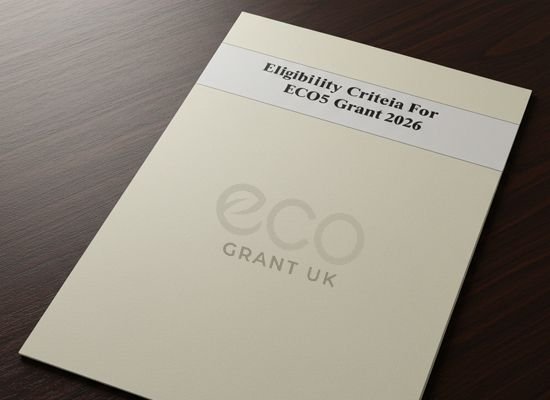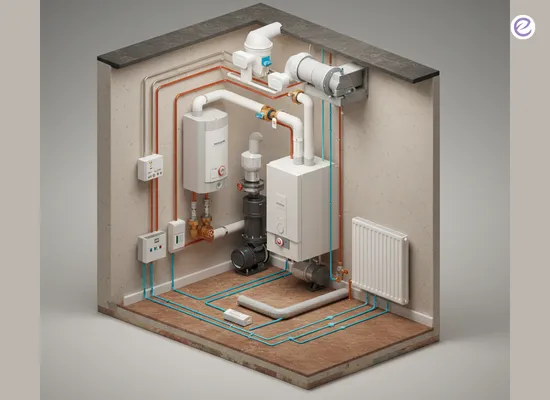ECO5 Grant UK – Check Eligibility, Launch Date & Benefits
High energy bills in cold winters? The ECO5 Grant is here to help! Launching in April 2026, this new scheme will offer free and low-cost upgrades like insulation, heat pumps, and solar panels to make homes warmer and more energy-efficient. With bigger funding and easier eligibility, more people can save money while going green. Don’t wait and get ready to upgrade your home and cut your energy costs!
What is ECO5 Grant? Background of ECO Grants
The ECO5 Grant is the latest phase of the UK government’s Energy Company Obligation (ECO) scheme, set to launch in 2026. It aims to improve energy efficiency in low-income households by funding home upgrades such as insulation, heating system improvements, and renewable energy solutions. ECO5 continues the government’s efforts to reduce carbon emissions and tackle fuel poverty, ensuring that homes are more energy-efficient and cost-effective to heat.
The ECO scheme was first introduced in 2013 to replace previous energy efficiency programs. Over the years, it has evolved through multiple phases:
-
ECO1 (2013-2015): Focused on providing insulation and heating improvements for vulnerable households.
-
ECO2 (2015-2017): Expanded to cover a wider range of energy efficiency measures.
-
ECO3 (2018-2022): Shifted focus toward low-income households, emphasizing insulation and boiler replacements.
-
ECO4 (2022-2026): Prioritized whole-house retrofits, targeting long-term energy efficiency rather than individual upgrades.
ECO5 is expected to build upon these foundations with stricter regulations, enhanced funding options, and a greater focus on sustainable energy solutions. It will likely emphasize heat pumps, solar panels, and modern insulation technologies to align with the UK’s net-zero carbon goals.
ECO4 Vs ECO5 Grant – Side By Side Comparison
The ECO5 scheme is set to outperform ECO4 in scale, funding and impact by making crucial home upgrades accessible to more homes. With a higher budget, relaxed eligibility and focus on renewable energy, ECO5 is expected to double the number of homes upgraded while delivering greater savings on energy bills. Below is a detailed comparison between ECO4 and the anticipated ECO5 grant, highlighting key improvements and projected figures.
| Category | ECO4 (2022-2026) | ECO5 (2026-2030) (Projected) |
|---|---|---|
| Total Budget (£ Billion) | 4.0 | 6.5 |
| Annual Funding (£ Billion) | 1.0 | 1.625 |
| Targeted Households (Million) | 0.45 | 0.9 |
| Household Income Threshold (£) | 31,000 | 40,000 – 55,000 |
| Eligible EPC Ratings | E-G | D-G |
| Expected Heat Pump Installations | 20,000 | 75,000 |
| Solar PV Installations (Mandatory Pairing %) | 10% | 50% |
| Cavity & Loft Insulation Upgrades | 350,000 | 700,000 |
| Solid Wall Insulation Installs | 50,000 | 150,000 |
| Smart Heating Control Installations | 150,000 | 500,000 |
ECO5 Launching Date & It’s Structural Changes
ECO5 is expected to launch in April 2026 as the next phase of the UK’s Energy Company Obligation scheme, bringing significant refinements to its predecessor, ECO4. The government’s goal is to expand the program’s impact, aligning with broader energy efficiency and carbon reduction strategies.
1- Relaxation in Eligibilty
One of the major changes in ECO5 is the extension of eligibility criteria. The ECO4 scheme is primarily focused on homes with Energy Performance Certificate (EPC) ratings of E to G, on the other hand ECO5 may include properties rated D. This change could significantly increase the number of eligible households so, millions of people could get benefit from energy efficiency upgrades.
By extending the eligibility criteria, ECO5 aims to support the UK’s Clean Heat Market Mechanism, which targets 600,000 heat pump installations annually by 2028. Including more homes will be taking part in the country’s transition to low-carbon heating solutions by reducing overall energy consumption and household costs.


2- More Focus on Less Popular Heating Options
ECO5 is expected to focus modern energy solutions such as renewable heating technologies. Under ECO4, heat pump upgradations are not considered as top priority, but ECO5 may allocate a larger share of funding to ground-source and air source heat pumps. This shift is fully aligned with the government’s net-zero carbon emission target to promote the adoption of sustainable heating options.
Plus, there may be increased incentives for solar panels and battery storage systems, further integrating renewable energy into the UK’s residential sector. By promoting modern, efficient technologies, ECO5 aims to reduce reliance on fossil fuels and improve home energy performance.
3- Changes in Funds Allocation
A major change in ECO5 could be the introduction of hybrid financing models. Unlike ECO4, which relied solely on grants, ECO5 might combine government funding with low-interest loans for costly improvements such as solid wall insulation and full heating system overhauls. This approach would allow homeowners to access more extensive upgrades while spreading the cost over time.
Such flexibility could make high-cost measures more accessible, ensuring that more households benefit from long-term energy savings. Additionally, private-sector partnerships may play a greater role in delivering ECO5 projects, potentially enhancing the program’s reach and effectiveness.

Eligibility Criteria for ECO5 Grant – Who Will Qualify For ECO5 Scheme?
ECO5 is designed to help people struggling with high energy bills by funding home improvements like better insulation and heating upgrades. However, not everyone qualifies automatically. The government sets specific eligibility criteria to ensure the help goes to those who need it most. Here’s what you need to know
Income Limits:
-
Under ECO4, only households earning less than £31,000 per year were eligible.
-
ECO5 is expected to raise this limit to £40,000 for single-income households and £55,000 for families with multiple earners.
-
This change means that middle-income families, who are also struggling with rising energy costs, can now apply.
Vulnerable Houses:
-
If you have young children (under 5 years old), you may qualify, as these homes tend to use 32% more energy.
-
If someone in your home has a chronic breathing condition like asthma, ECO5 recognizes that poor heating can worsen their health.
-
If you live in an area where at least 15% of people struggle with heating costs, your home may be prioritized.
Qualification Based on Benefits & Living Conditions
-
ECO4 required you to receive certain benefits to qualify.
-
ECO5 might introduce a new points-based system, where you can qualify based on:
-
If more than 15% of your income goes towards energy bills.
-
If your area has poor air quality.
-
If your home has serious damp or mold issues (affecting 4% of UK homes).
Property Requirements:
-
Your home’s Energy Performance Certificate (EPC) rating must be D or lower before the upgrades.
-
After the improvements, the goal is to raise your home’s rating to C, making it more energy-efficient and cheaper to heat.
Priority will be given to homes that are harder to keep warm, including:
-
Solid wall houses (which make up 25% of UK homes).
-
Rural homes not connected to gas (about 4.5 million homes).
-
Old buildings (especially those built before 1920) that still have their original features.
Important Timelines for ECO5 Grant
You have to keep an eye on some important dates, deadlines and gather necessary documents to get early installation. Homeowners should obtain updated EPC certificates by Q4 2025 and complete necessary planning permissions for external insulation or heat pump installations during 2025’s warmer months to avoid installation delays. As the scheme will be allocated on first come first serve basis so, it is essential to stay updated with latest upgradations. Let’s now check how ECO5 grant will be launched and when it will enter in final phases.

Scheme Finalization (Q3-2025)

Soft Launching (Q1-2026)

Implementation (Q2-2026)
Planning to Apply For ECO5 Grant? Schedule Your Grant Before Time With Team ECO Grant UK
What Upgradations are Available Under ECO5 Grant?
ECO5 will fund a variety of home energy efficiency improvements, helping homeowners reduce energy bills and carbon emissions. The grant will cover both heating system upgrades and insulation enhancements, while also encouraging the integration of renewable energy solutions.
1- Heating System Upgradation Grant
- Hybrid Heat Pumps: A combination of air-source heat pumps (ASHPs) and hydrogen-ready boilers to provide efficient heating year-round.
- Solar-Assisted Heat Pumps: Integrating photovoltaic thermal (PVT) panels with heat pumps to generate both electricity and heating.
- High-Efficiency Boilers: Upgrading old gas boilers with hydrogen-ready models to align with the UK’s future energy strategy.
- Smart Heating Controls: Intelligent thermostats and automated heating systems that optimize energy use based on occupancy and weather conditions.
2- Insulation Upgradation Grant
- Solid Wall Insulation: External or internal insulation to improve heat retention in older buildings.
- Loft and Cavity Wall Insulation: Preventing heat loss through the roof and walls, reducing heating demand.
- Aerogel-Infused Plaster: Advanced thin insulation material offering high thermal resistance.
- Robotic Loft Insulation: Faster, more precise insulation installations using robotic technology.
3- Renewable Energy Grant
-
Mandatory Solar PV Pairing: Homes installing heat pumps may be required to pair them with solar panels to enhance energy efficiency.
-
Battery Storage Systems: Allowing homeowners to store excess solar energy for later use.
-
Community Energy Solutions: Shared energy storage for terraced housing to make solar power more accessible.
Eligible Countries for ECO5 Scheme

England

Scotland

Wales
How Landlords Will Benefit From ECO5 Program?
Under ECO5, landlords will need to make their properties more energy-efficient to meet new rules. The government plans to introduce stricter regulations, making energy upgrades a priority for rental properties.
New Rules for Landlords
By 2028, all new rental agreements may require the property to have at least an EPC rating of C. This means landlords must improve insulation, heating systems, or other energy-saving features. Houses in Multiple Occupation (HMO properties) that don’t meet the required energy standards could face a 150% increase in council tax, making it costly to ignore upgrades.
ECO5 Benefits for Landlords
Financial support during upgrades will be available, allowing landlords to receive up to 24 months of financial coverage if their property is vacant during retrofitting. Tax benefits such as higher wear-and-tear allowances will help reduce the overall costs of energy efficiency improvements. Those who own multiple rental properties could also benefit from portfolio-wide assessment discounts, making it more affordable to upgrade several homes at once.
By upgrading the properties under ECO5, landlords can avoid penalties, reduce costs, and attract tenants looking for energy-efficient homes.
Primary Goals of ECO5 Grant 2026
The ECO5 grant is designed to be a game-changer in energy efficiency, targeting 6.5 MtCO2e (metric tons of CO₂ equivalent) in annual savings by 2030. It will be helpful in achieving UK’s Net Zero 2050 goal by reducing household carbon emissions through better insulation, renewable heating systems and advanced energy-saving technologies. ECO5 will ensures a substantial reduction in overall energy consumption and environmental impact by making your homes energy efficient.
One of the most impactful aspects of ECO5 is the 90% reduction in heating-related emissions for upgraded homes. This will be achieved through hybrid heat pumps, solar-assisted heating, and improved home insulation, cutting down reliance on fossil fuels. Homeowners will see lower energy bills, improved indoor comfort, and a greener footprint.
To maintain high-quality installations, ECO5 introduces mandatory post-installation monitoring for 36 months. This means households receiving upgrades will undergo regular efficiency checks, ensuring the installed measures deliver the promised energy savings. The monitoring will identify performance issues early, providing better accountability for energy suppliers and installers.

Conclusion
The ECO5 Scheme is not just an update to existing policies—it’s a major change in how home energy improvements are carried out. By introducing new financing options, better monitoring, and solutions for entire communities, ECO5 aims to upgrade 850,000 homes by 2030, helping homeowners save a total of £2.1 billion on energy bills each year.
Homeowners who start making upgrades now under ECO4 while preparing for ECO5 can benefit the most, both financially and environmentally. As the government finalizes the details of ECO5 in 2025, it’s important to stay informed by consulting certified installers and local authorities.
This analysis brings together the latest data from ECO4, carbon reduction targets, and upcoming policy trends to predict what ECO5 will look like. While the final details are still pending, this guide offers useful insights for homeowners, landlords, and policymakers to navigate the UK’s changing energy policies effectively.